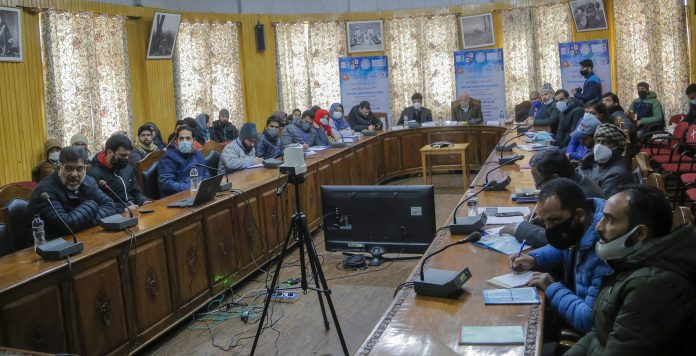Srinagar: On the third day of the Vigyan Sarvatre Pujyate (Science & Technology is Revered All Over), Festival for All, under Science & Technology Communication, Popularization & its Extension (SCOPE), various activities were conducted under the theme “A key discovery innovation that made mark in global science or India’s development story.”
The festival is being jointly organised by the Central University of Kashmir (CUK), University of Kashmir (KU), in collaboration with Vigyan Prasar, at Gandhi Bhawan in University of Kashmir.
Speaking on the topic “Contribution and Development of Biological Sciences,” Registrar, CUK, Prof. M Afzal Zargar, categorised the key events in biological and life sciences, their evolution and gave historical perspective of certain people who made contributions in ancient civilizations. Talking about the contributions of scholars and scientists, he said, “Take chances in life, do experiments, but be truthful to science and experiments as they may lead to new discoveries.”
From SKUAST-Kashmir, Dr. Zahoor A Dar, in his lecture on “Role of SKUAST in Agricultural progress in Kashmir” said the varsity has become a knowledge hub in agricultural sciences. “We are merging education with entrepreneurship to create a space where there can be scope of major changes and development.” “One of our major achievements has been the Pashmina Goat Clone-Noori and developing 104 crop varieties.”
Addressing the participants on the topic “Biomedical Research in India”, Prof. Bashir Ahmad Ganaie of CORD, KU, gave an insight on post-independence science and research in India. He said, “Science isn’t the study of or for countries or nations, but it’s for mankind so that people could avail its benefits and live a comfortable life.”
Presidium of the Session, Dean Academic Affairs, KU, Prof. Farooq Ahmad Masoodi, in his lecture said, “Revolution in molecular biology and biotechnology has begun. We will keep on using this as a cure for various ailments and evolve new organisms from it. What was not even thinkable 15-20 years ago, today we have achieved it by the use of science.”
In the afternoon session, three documentaries were screened: “Global Warming- A catastrophe in the making,” by Mr Shafqut Habib and Prof. Shahid Rasool, “The Bitter Truth- Dal losing battles between locals and authorities” by Er. Abdul Rashid and “Food Science and Technology” by Ms Rehana Akhtar.
Earlier, the activities were held online on the second day yesterday. The theme was “Annals of History of Science”- a look at the founders of modern science and tracing how their contributions helped India establish modern Science and technology systems in institutions of national importance and how they contributed to nation building. Addressing the participants, Director Computer Sciences University of Kashmir, Dr. Maroof Qadri said the Information Communication Technology (ICT) has revolutionised the present education scenario. “The students should prepare for an increasingly competitive work environment,” he said.
Prof. Zafar Ahmad, Deptt of Botany, KU, spoke about the historical perspective of the Life Sciences in India. Others who speak on the occasion, included, Prof Mohammad Yousuf, Prof. Wali Mohammad Shah and Prof. M. Akber Khuroo, session presidium.


